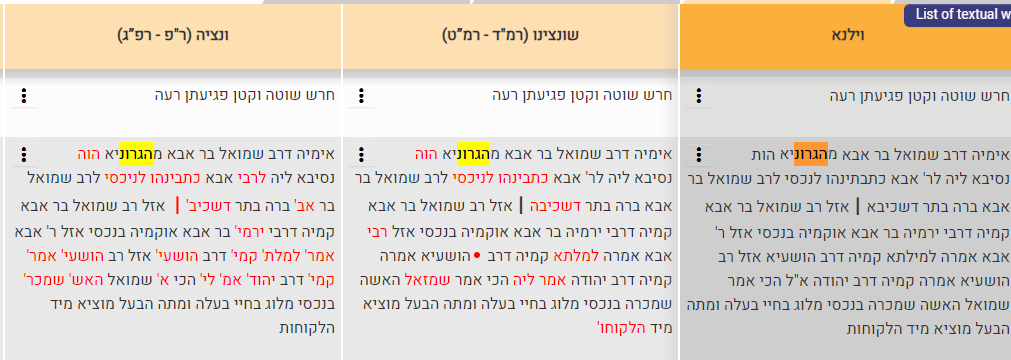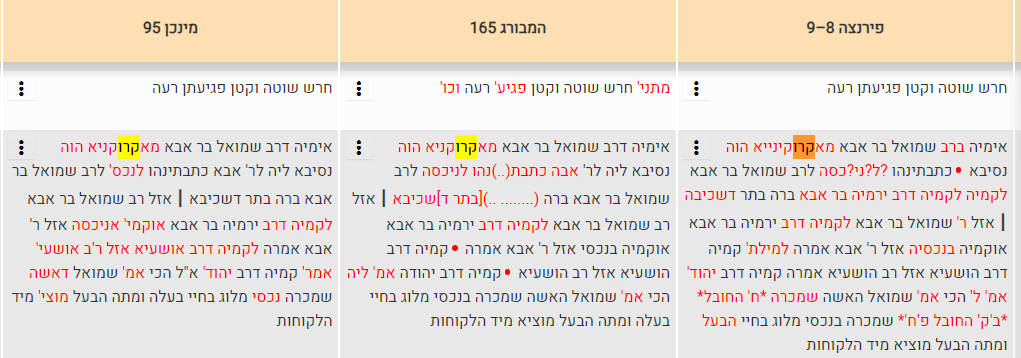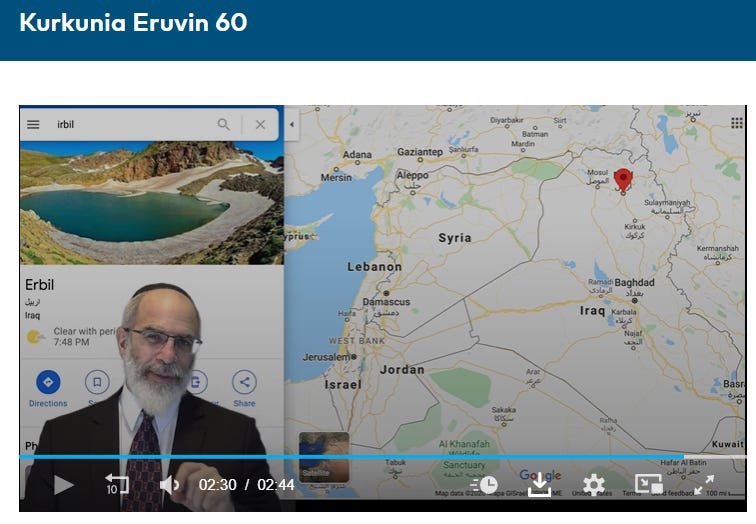Hagronia vs. Kurkonia
In the daf from two days back, Bava Kamma 88a-b, we saw Rav Shmuel bar Abba of Hagronia.
חֵרֵשׁ, שׁוֹטֶה וְקָטָן פְּגִיעָתָן רָעָה. אִימֵּיהּ דְּרַב שְׁמוּאֵל בַּר אַבָּא מֵהַגְרוֹנְיָא הֲוָת נְסִיבָא לֵיהּ לְרַבִּי אַבָּא, כְּתַבְתִּינְהוּ (לְנִכְסֵי) [לְנִכְסַהּ] לְרַב שְׁמוּאֵל בַּר אַבָּא בְּרַהּ. בָּתַר דִּשְׁכִיבָא,
The mishna (87a) teaches: With regard to a deaf-mute, an imbecile, or a minor, an encounter with them is disadvantageous, since one who injures them is liable. But if they were the ones who injured, they are exempt. The Gemara relates an incident: The mother of Rav Shmuel bar Abba from the city of Hagroneya was married to Rabbi Abba. She wrote, i.e., signed over, her property to Rav Shmuel bar Abba, her son. After she died,
אֲזַל רַב שְׁמוּאֵל בַּר אַבָּא קַמֵּיהּ דְּרַבִּי יִרְמְיָה בַּר אַבָּא, אוֹקְמֵיהּ בְּנִכְסֵי. אֲזַל רַבִּי אַבָּא אַמְרַהּ לְמִילְּתָא קַמֵּיהּ דְּרַב הוֹשַׁעְיָא, אֲזַל רַב הוֹשַׁעְיָא אַמְרַהּ קַמֵּיהּ דְּרַב יְהוּדָה. אֲמַר לֵיהּ, הָכִי אָמַר שְׁמוּאֵל: הָאִשָּׁה שֶׁמָּכְרָה בְּנִכְסֵי מְלוֹג בְּחַיֵּי בַּעְלָהּ, וָמֵתָה – הַבַּעַל מוֹצִיא מִיַּד הַלָּקוֹחוֹת.
Rav Shmuel bar Abba went before Rabbi Yirmeya bar Abba to claim his mother’s property. Rabbi Yirmeya established him as the owner of the property, in accordance with what was written in the document. Rabbi Abba, the mother’s husband, went and said a report of the matter before Rav Hoshaya. Rav Hoshaya went and said a report of the matter before Rav Yehuda. Rav Yehuda said to Rav Hoshaya: This is what Shmuel says: In a case of a woman who sold her usufruct property, which belongs to her but whose profits her husband garners, in her husband’s lifetime, and then she died, the husband repossesses the property from the purchasers. The granting of her property by means of the document is analogous to a sale, and Rabbi Abba can repossess the property from Rav Shmuel bar Abba.
However, as far as I can tell, coming from the city of Hagronia is just the printed texts.
The Rif has Akrokania:
גמ' אמיה דרב שמואל בר אבא מאקרוקניא הות נסיבא ליה לרב אבא כתבתינהו לניכסה לרב שמואל ברה אזל רב שמואל בר אבא לקמיה דרבי ירמיה בר אבא אוקמיה בנכסיה מהא דתנן הכותב נכסיו לבנו לאחר מותו האב אינו יכול למכור
as do manuscripts:
Indeed, Jastrow has the same, referring to manuscripts:
The initial aleph may not be a typo. It seems to me to be an ascendetic aleph, used to help with consonant clusters at the beginning of a word (e.g. star vs. astral), thus dividing the consonant cluster into two syllables. And then, when it went to print, there was an oral error for Hagronia, because it sounds similar and the scribe/printer had never heard of Kurkunia. But it does seem to be a place in Babylonia.
Here Dr. Henry Abrahamson discusses Kurkunia, KaiNai on the Tigris River, south of the river Zab.
Meanwhile, Hagronia is a town located on the Euphrates, and was a citadel for Nehardea.
Local to our sugya, maybe it doesn’t matter so much. Except it might a little. Who are the people that this case is coming before, in the gemara? For instance, Rav Hoshaya, or Rav Yehuda. In what cities did they dwell? (There’s also the phenomenon of ki ata Rav Oshaya minehardea, in several locations, with two interpretations, that he was Rav Oshaya of Nehardea who came from Israel, or that when coming now, the plain Rav Oshaya he came from Nehardea.) I don’t have the time to explore this further, but taking note of this is sufficient.









